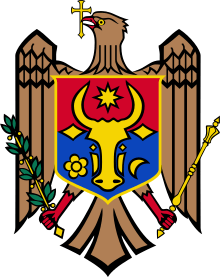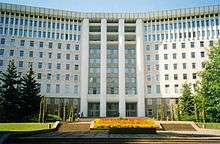Politics of Moldova
 |
| This article is part of a series on the politics and government of Moldova |
|
Judiciary |
|
Executive
|
| Administrative divisions |
|
Foreign policy |
The politics of Moldova takes place in a framework of a parliamentary representative democratic republic, wherein the prime minister heads the government, and of a multi-party system. The government exercises executive power. Legislative power is vested in the Parliament. The judiciary is independent of the executive and the legislature. The position of the breakaway region of Transnistria (a self-proclaimed autonomous region, on the left side of the river Nistru), relations with Romania and with Russia, and integration into the EU dominate political discussions.
Legislative branch
The Moldovan Parliament (Parlamentul) has 101 members, elected for a four-year term by proportional representation. The president is elected for a four-year term by parliament.
The seat of the legislature is known simply as the Parliament Building.
Political parties and elections
| Parties and coalitions | Votes | % | Seats | +/- | ||
|---|---|---|---|---|---|---|
| Party of Socialists (PSRM) | 327,910 | 20.51 | 25 | New | ||
| Liberal Democratic Party (PLDM) | 322,188 | 20.16 | 23 | –9 | ||
| Party of Communists (PCRM) | 279,372 | 17.48 | 21 | –21 | ||
| Democratic Party of Moldova (PDM) | 252,489 | 15.80 | 19 | +4 | ||
| Liberal Party (PL) | 154,507 | 9.67 | 13 | +1 | ||
| Communist Reformist Party | 78,719 | 4.92 | 0 | New | ||
| 'Moldova's Choice - Customs Union' Electoral Bloc | 55,089 | 3.45 | 0 | New | ||
| Popular Movement Anti-Mafia Party | 27,843 | 1.74 | 0 | New | ||
| Liberal Reformist Party | 24,956 | 1.56 | 0 | New | ||
| People's Party of Moldova | 12,112 | 0.76 | 0 | New | ||
| Christian-Democratic People's Party (PPCD) | 11,782 | 0.74 | 0 | 0 | ||
| Force of the People Party | 11,672 | 0.73 | 0 | New | ||
| National Liberal Party | 6,859 | 0.43 | 0 | 0 | ||
| Revival Party | 4,158 | 0.26 | 0 | New | ||
| Democratic Action Party | 2,564 | 0.16 | 0 | New | ||
| Democracy at Home | 2,449 | 0.15 | 0 | New | ||
| For Nation and Country Party | 1,697 | 0.11 | 0 | 0 | ||
| Patriots of Moldova | 1,498 | 0.09 | 0 | 0 | ||
| Ecologist Green Party | 1,366 | 0.09 | 0 | 0 | ||
| Centrist Union | 633 | 0.04 | 0 | New | ||
| Independents | 18,651 | 1.17 | 0 | 0 | ||
| Invalid/blank votes | 50,948 | |||||
| Total | 1,649,508 | 100 | 101 | 0 | ||
| Registered voters/turnout | 2,953,276 | 55.85 | ||||
| Source: CEC | ||||||
In the 2010 Parliamentary election, the Communists won 42 seats, while the Liberal-Democrats won 32, the Democratic Party won 15, and the Liberals won 12. This gave the Alliance for European Integration 59 seats, two short of the 61 needed to elect a President. The result thus maintained the status quo following the contemperaneous constitutional deadlock.
Observers from the Organization for Security and Co-operation in Europe (OSCE) and the Council of Europe lauded the election.
Executive branch
| Office | Name | Party | Since |
|---|---|---|---|
| President | Nicolae Timofti | Independent | 23 March 2012 |
| Prime Minister | Pavel Filip | Democratic Party | 20 January 2016 |
The president is elected by the Parliament for a four-year term. According to the Moldovan constitution, the president, on consulting with the parliament, will designate a candidate for the office of prime minister; within 15 days from designation, the prime minister-designate will request a vote of confidence from the parliament regarding his/her work program and entire cabinet. The cabinet is selected by prime minister-designate, subject to approval of parliament. The cabinet meets at Government House on Stephen the Great Boulevard in Central Chișinău.
Ministries
The 16 ministries of the Government of Moldova are:
- Ministry of Internal Affairs of Moldova
- Ministry of Finance
- Ministry of Transport and Roads Infrastructure
- Ministry of Foreign Affairs and European Integration
- Ministry of Economy
- Ministry of Education
- Ministry of Construction and Regional Development
- Ministry of Labor, Family and Social Protection
- Ministry of Defense
- Ministry of Justice
- Ministry of Agriculture and Food Industry
- Ministry of Health
- Ministry of Culture
- Ministry of Environment
- Ministry of Youth and Sports
- Ministry of Informational Technologies and Communication
Administrative divisions
Moldova is divided into 32 raions, or raioane, three municipalities (Chişinău, Bălţi and Bender), one autonomous region (Gagauzia), and the breakaway region of Transnistria, the status of which is disputed.
Issues
There is disagreement as to whether elections and politics in Moldova are carried out in a free and democratic climate on the part of certain organizations. The United States Senate has held committee hearings on irregularities that marred elections in Moldova, including arrests and harassment of opposition candidates, intimidation and suppression of independent media, and state run media bias in favor of candidates backed by the Communist-led Moldovan Government.[1] Other critics have also referred to the Communist Party government as being authoritarian.[2][3] Nevertheless, George W. Bush stated that: "We note and welcome Moldova's positive record since independence in conducting free and fair elections and in implementing democratic reforms."[4]
There have also been reports of politically motivated arrests and arrests without valid legal grounds. Such arrests are allegedly carried out against opponents of the Communist Party government of President Vladimir Voronin. In one case which was criticized by various Western organizations and individuals, opposition politician Valeriu Pasat was sentenced to ten years imprisonment on dubious grounds.[5]
Moldova had successfully joined the World Trade Organization and the Southeast European Stability Pact in 2001. Of primary importance have been the government's efforts to improve relations with the International Monetary Fund and the World Bank and to comply with agreements negotiated in 2000 by the former government. Agreement in these areas was critical, because large government debts that were due in 2002 had to be rescheduled. The government has made concerted efforts to find ways to pay for Moldova's energy supplies.
Political parties and other groups publish newspapers, which often criticize government policies. There are several independent news services, radio stations, and an independent television station. Peaceful assembly is allowed, though permits for demonstrations must be obtained; private organizations, including political parties, are required to register with the government. Legislation passed in 1992 codified freedom of religion but required that religious groups be recognized by the government.
A 1990 Soviet law and a 1991 parliamentary decision authorizing formation of social organizations provide for independent trade unions. However, the Federation of Independent Trade Unions of Moldova, successor to the former organizations of the Soviet trade union system, is the sole structure. It has tried to influence government policy in labor issues and has been critical of many economic policies. Moldovan labor law, which is based on former Soviet legislation, provides for collective bargaining rights.
Human trafficking
Due to the high rate of poverty, Moldova remains a large source-country of illegal sex workers that are exported to Western Europe, Russia and the Middle East. Because of pervasive corruption and a general lack of awareness, many victims of human trafficking are lured into the business with offers of high-salary jobs abroad, and are often trapped once out of the country. The US government urged Moldova to pass an anti-trafficking law in 2005, but due to a lack of enforcement, low regard of legal institutions, and unequal benchmark requirements, clear progress is difficult to ascertain. Organizations such as the International Organization for Migration provide non-governmental support integral to helping victims. However, NGOs are often subject to domestic constraints and government interference in their work, complicating their operations.
Transnistria

The Moldovan Declaration of Independence clearly and directly claims Moldovan sovereignty over the territory of Transnistria as it is "a component part of the historical and ethnic territory of our people". However the Moldovan Declaration of Independence is itself used as an argument against Moldovan sovereignty over Transnistria as it denounces the agreement of 23 August 1939 between the government of the Soviet Union and the government of Germany "null and void" being the only formal union between the two territories.[6]
After failing to establish control over the breakaway region in the War of Transnistria, Moldova offered a rather broad cultural and political autonomy to the region. The dispute has strained Moldova's relations with Russia. The July 1992 cease-fire agreement established a tripartite peacekeeping force composed of Moldovan, Russian, and Transnistrian units. Negotiations to resolve the conflict continue, and the cease-fire is still in effect. The OSCE is trying to facilitate a negotiated settlement and has had an observer mission in place for several years.
The country remains divided, with the Transnistrian region along the Ukrainian border controlled by separatist forces.
Notes
- ↑ U.S. Library of Congress, Senate report 2004
- ↑ Statement of Committee to Protect Journalists (CPJ)
- ↑ Press freedom report (CPJ)
- ↑ Joint Statement by President George W. Bush and President Vladimir Voronin on U.S.-Moldovan Relations U.S. State Department 17 December 2002. Retrieved 11-20 2006.
- ↑ Moldova: An Insider Looks At The Pasat Case Radio Free Europe. 4 July 2005. Retrieved 11-15 2006
- ↑ Tiraspol Times; Former ASSR Pridnestrovie reminds Moldova: "You yourself denounced our union"
